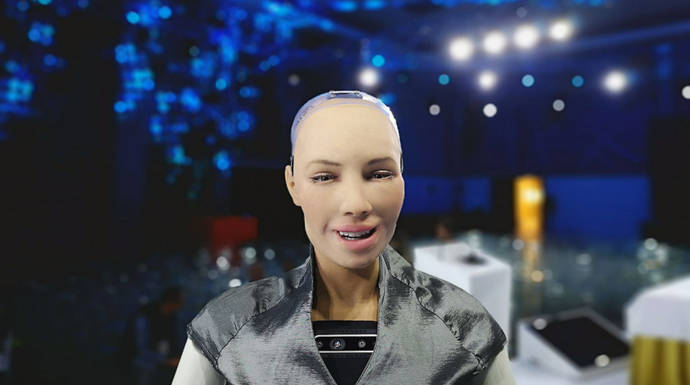Sophia, who was first presented at South by Southwest in Texas in 2016, has become a prominent example of realistic humanoid robots which embody AI. The company designed Sophia as a social robot which could be incorporated into nursing homes.
Sophia uses speech-recognition technology from Alphabet and speech synthesis from Cereproc, in addition to Hanson Robotics’ own software for analysing conversations and generating responses. The robot is modelled after famously beautiful women and is capable of holding a simple conversation on limited subjects (such as the weather); imitating human gestures, and has 60 facial expressions, as well as the ability to sing. In 2018, the robot was upgraded with functional legs.

Reuters has reported that Hanson Robotics is now preparing to mass-produce Sophia and three other social humanoid robots. Production is set to begin in the first half of 2021, as researchers expect the Covid-19 pandemic will open up new opportunities for the robotics industry.
“The world of Covid-18 is going to need more and more automation to keep people safe,” David Hanson, founder and CEO of Hanson Robotics, told Reuters. He commented that robots like Sophia could have applications in healthcare, customer service and hospitality: one of the new Hanson robots, ‘Grace’, is intended for the healthcare sector. Hanson told Reuters that he aims to sell thousands of robots in 2021.
“Sophia and Hanson robots are unique by being so human-like. That can be so useful during these times where people are terribly lonely and socially isolated.”

Professor Johan Hoorn, an expert in social robots at Hong Kong Polytechnic University, told Reuters that the pandemic may encourage humans to form relationships with social robots sooner than expected: “I can infer the pandemic will actually help us get robots earlier in the market because people start to realise that there is no other way.”
Measures to suppress the coronavirus pandemic, which primarily involve physical distancing between people, has spurred the introduction of robots to workplaces. In the UK, robotic cleaners have been deployed at busy transport hubs such as Heathrow Airport and St Pancras station, while elsewhere robots have been used to attend to quarantined hotel guests and serve customers in cafes.
A report from the Royal Society for Arts, Manufactures, and Commerce examining the impact of the coronavirus pandemic on the labour market concluded that Covid-19 has pushed sectors such as hospitality, retail, and manufacturing to accelerate automation.














